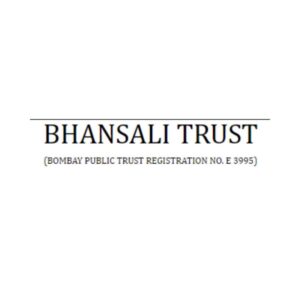Mr. Ashok Bhansali
Bhansali Trust
Area of Intervention
Bhansali Trust has undertaken a diverse range of initiatives in fields such as healthcare, education, income generation, micro-credit, de-addiction, and various socio-economic endeavors.

About
Established in 1969, the Bhansali Trust originated from the unity of seven brothers belonging to the Bhansali Family (Bhansali & Co). Over the years, it has diligently undertaken a diverse range of initiatives in fields such as healthcare, education, income generation, micro-credit, de-addiction, and various socio-economic endeavors. Additionally, the trust has actively engaged in relief efforts during natural disasters. These endeavors have predominantly focused on the economically disadvantaged regions of Gujarat, particularly those bordering Rajasthan.
The youngest member of the family, Ashok, alongside his wife Shital, commenced dedicating five days each month to the project area in 1983. Currently, they allocate a significant portion of their time, 12 days a month, to oversee projects in various states. Ashok has devoted 90% of his time to corporate social responsibility (CSR) activities and tribal projects.
Mr. Ashok Bhansali serves as one of the founding trustees of the Bhansali Trust, which was founded in 1969 by the Bhansali family. The Bhansali family is renowned for their leadership in one of India’s top diamond companies, Bhansali & Co. Ashok’s philanthropic focus and areas of interest encompass a wide spectrum, including education, healthcare, mental health services, eye care, micro-credit initiatives, income generation programs, disaster relief efforts, and de-addiction programs, with a particular emphasis on rural areas.
The Trust actively operates a range of projects in one of Gujarat’s most socioeconomically disadvantaged regions, which shares its border with Rajasthan.
Hailing from a family deeply rooted in the diamond trade, Mr. Ashok Bhansali possesses firsthand knowledge of philanthropy.
Witnessing his brothers’ active involvement in philanthropic endeavors and their hands-on approach greatly inspired him to spearhead initiatives in critical areas such as primary healthcare, infant mortality, maternal mortality, and malnutrition.
Mr. Ashok, who dedicates 12 days of every month to his philanthropic pursuits, also advocates for others to engage in field visits, emphasizing that such visits are the most effective means to comprehend the realities on the ground. Collaboration stands as a cornerstone in the projects undertaken by Bhansali Trust, allowing the organization to harness the collective strengths of various stakeholders and experts to make a lasting impact.
Bhansali Trust’s Impact:
- The percentage of severely malnourished children has significantly decreased, dropping from 15% to a remarkable 3%.
- Major epidemics of measles, whooping cough, and diphtheria have been notably curtailed through regular vaccination programs.
- The infant mortality rate has seen a remarkable 50% reduction.
- A successful Safe Motherhood Program, along with training for Traditional Birth Attendants (Dais) and the implementation of various measures, has led to a substantial decline in maternal deaths, reducing them from 7.5 per 1000 births to just 1.5.
- Childhood blindness has been nearly eradicated, ensuring a brighter future for young lives.
- Night blindness, a prevalent issue among adults, has been completely eradicated.
- Over the past 8 years, an impressive total of 12,031 laparoscopic surgeries have been performed to support family planning efforts.
- Eye Care:
- Across Gujarat, Bihar, Rajasthan, and Madhya Pradesh, over 850,000 cataract surgeries have been performed, significantly improving eye health.
- Since 2014, eye operation camps have been organized in Jharkhand, extending the reach of eye care services.
- Education:
- The Women’s literacy rate, once alarmingly low, has shown steady improvement, with a significant number of children now attending school.
- Girls have gained access to high schools, and an impressive 2,000 students from high schools supported by the trust have gone on to become teachers.
- Income Generation:
- In addition to promoting income generation projects such as papad making and sewing, the trust provides small loans to empower underprivileged families to start their own businesses.
- A network of 4,800 Self Help Groups (Micro Credit Groups) has been formed in a relatively small area with a population of 1 million.
- As a result, 65,000 families have been able to break free from high-cost debt cycles, accessing loans at low-interest rates to initiate their own small businesses.
- Many families have even sent their children for higher education by leveraging loans from their respective Self Help Groups.
